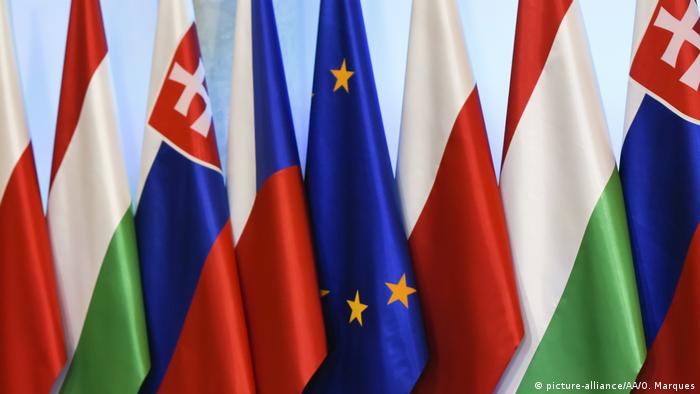The Visegrád States Poland, the Czech Republic, Slovakia and Hungary have rebel the reputation of the EU. You want to make the EU a little East, it is said again and again. In reality, their differences are considerable.

They are the “Scrappers”, the “counterweight to Brussels”, the “rebels” in the European Union. This and similar labels to stick for a few years, the so-called Visegrád-countries – Central and Eastern European EU countries Poland, the Czech Republic, Slovakia and Hungary, agreed in 1991 in the Hungarian Visegrád regional cooperation, to their Euro-Atlantic Integration together. After the EU enlargement in 2004, the Alliance had, for many years, hardly any political weight. But then the refugee crisis came, and together forged the Central and Eastern Europeans, again – against Brussels. Since then, the V4 in the Old EU as a “Concern” and the “Ostbock” that splits the EU.
The Visegrád countries reject, like most of the other Eastern European EU members, for a mandatory redistribution of refugees. They criticise the EU as an “Empire” and the EU Commission in Brussels as a “new Moscow Politburo”, the aufoktroyiere you decisions. They fear that a European multi-kulti-will overwhelm the identity of the national character of their companies to lose.

The proximity to the United States: Hungary’s Prime Minister Viktor Orban is seeking mid-may at the Trump
Or they complain about double Standards compared to the East of the EU, for example in the quality of food products. As far as the Rhetoric in the “Anti-Brussels-Eastern European countries.” On closer Inspection much of it turns out to be, however, as a little substantially. Even more: There is between the Visegrád States considerable freedom of expression, and differences of Interest.
EU politicians as a “looser”?
The V4 will appear just in the current EU election campaign as a Block. In Hungary and Poland, the government call on parties Fidesz and PiS, for the defence and salvation of Christian Europe. Hungary’s Prime Minister Viktor Orban has accused the EU Commission to plan for a population exchange and a mass settlement of Muslims. Czech Prime Andrej Babis rails, in turn, against a strong and politicised the EU-Commission in the Slovak governing party, SMER-SD will be referred to EU leaders as a “looser”.
Generally speaking, the Leaders plead, in Poland, Hungary and the Czech Republic for a stronger “Europe of Nations” and fewer powers for EU bodies. Concrete proposals for reform there are, however, hardly. Viktor Orbán suggested in March a Schengen interior Ministers, the care of border protection and migration issues. Andrej Babis, requires that the European Council should be the body of the heads of state and government of the European Union – a kind of last decision – making body of the EU. In contrast to Orbán, Babis, however, is far less Euro-skeptical, what with his business interests: His Agrofert group comprises firms throughout the EU and benefited greatly from EU subsidies. Babis is ankteren first and foremost, to a deterioration, more efficient EU interested.
Slovakia, in turn, is a member of the Euro-zone and feels to the core of Europe. Recently, was elected in the country is very Pro-European, left-liberal-progressive Zuzana Caputova to the state President. Last year’s incumbent Prime Minister Peter Pellegrini clearly had a more Europe-friendly than his predecessor, Robert Fico, the head of the nominally social democratic party in government, SMER-SD, at times, a strongly nationalist-populist policy driven.
The big difference: The attitude to Russia
A veritable crack runs through the Visegrád group in a major foreign policy question, the country also cleaves many other EU: the relationship to Russia. Poland sees Russia as a threat and argues strictly in favor of additional sanctions and a greater detachment from an economic cooperation with Moscow, especially with regard to the Russian Gas and oil supplies to the EU. However, the Slovakia and especially Hungary are a very Russia-friendly policy. In particular, Viktor Orban meets Putin as regularly as no other EU head of government. Under the label of “Opening to the East”, Hungary has expanded its economic cooperation with Russia and Central Asian States in the last few years.
Like the leaders of the Visegrád countries also complain that taking away the history and the cultural sensitivities of Central and Eastern Europe in the West and the decades-long Soviet suppression of the Region’s fade-out, the contributions, that you “could not accept Brussels ‘diktats”.

Far less Euro-skeptical as Orban: the Czech Republic’s Prime Minister Andrej Babis
However, this Narrative does not hold up to closer analysis. While in Poland, the Messianic, arch-conservative anti-communism of Jaroslaw Kaczynski is embossing, bears, Viktor Orbán, his anti-Communist past for a long time only as a figurehead – his party, Fidesz, has prevented, for example, the work-up of the Communist state security past, already in the 1990s actively. In the Czech Republic, in turn, a former real-socialist economy officiates in the Person of Andrej Babis, officials and employees of the Czechoslovak state security.
Actually, Hungary’s Prime Minister Orbán would like to be the leader of a strong Visegrád-block, which provides the decisive reform of the EU impulse to the national sovereignty of the member countries. Orbán had already call, in 2017 the “year of revolt” against the European Establishment, and against “Brussels bureaucrats” out. As the materialize, he said, in 2018, the year in which “the will of the European peoples again” was produced. Now he stylized the EU to the decision to battle for Survival or downfall of the Occident. The chances are that he also keeps this time, in the wrong, are not bad.